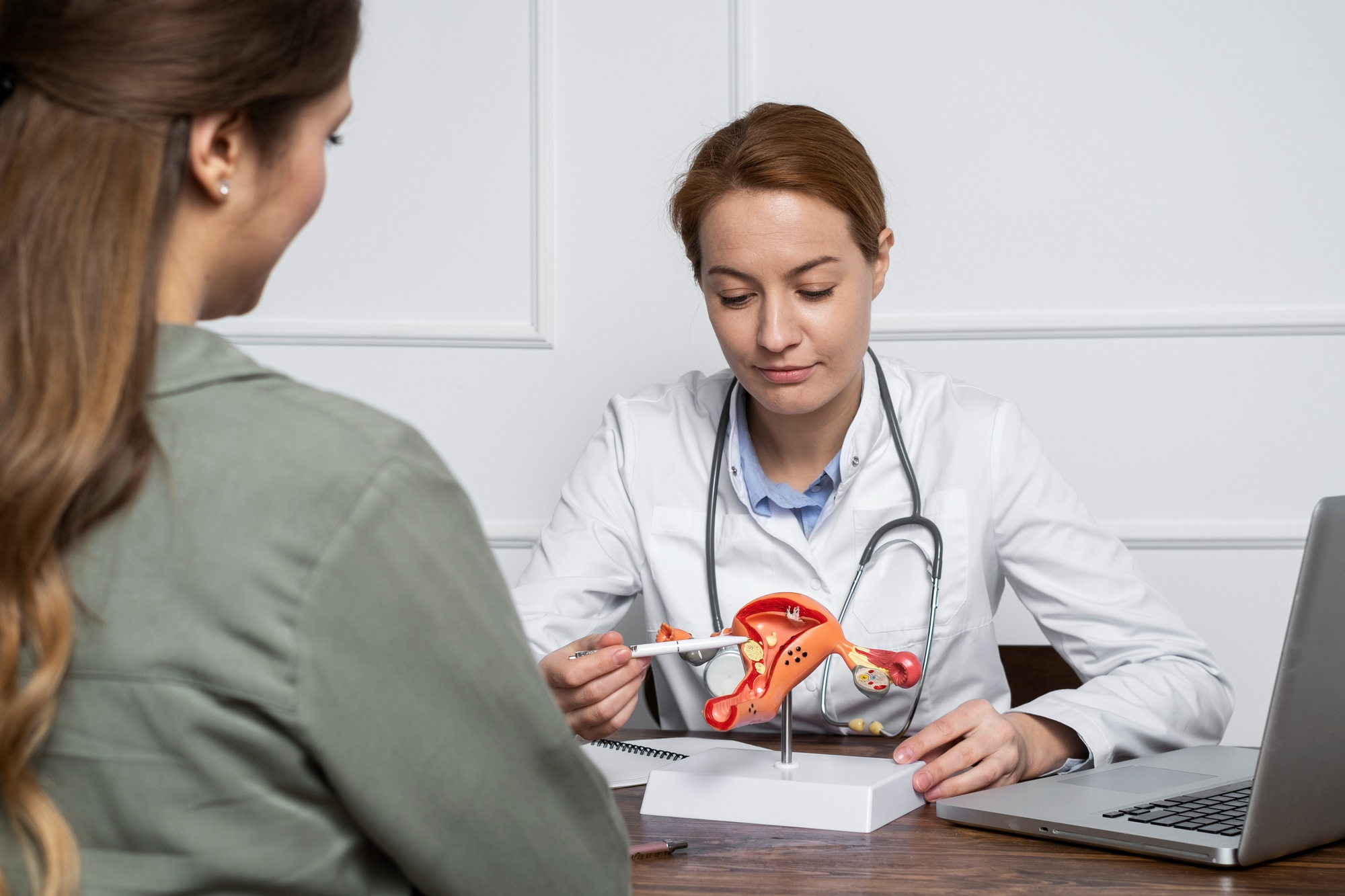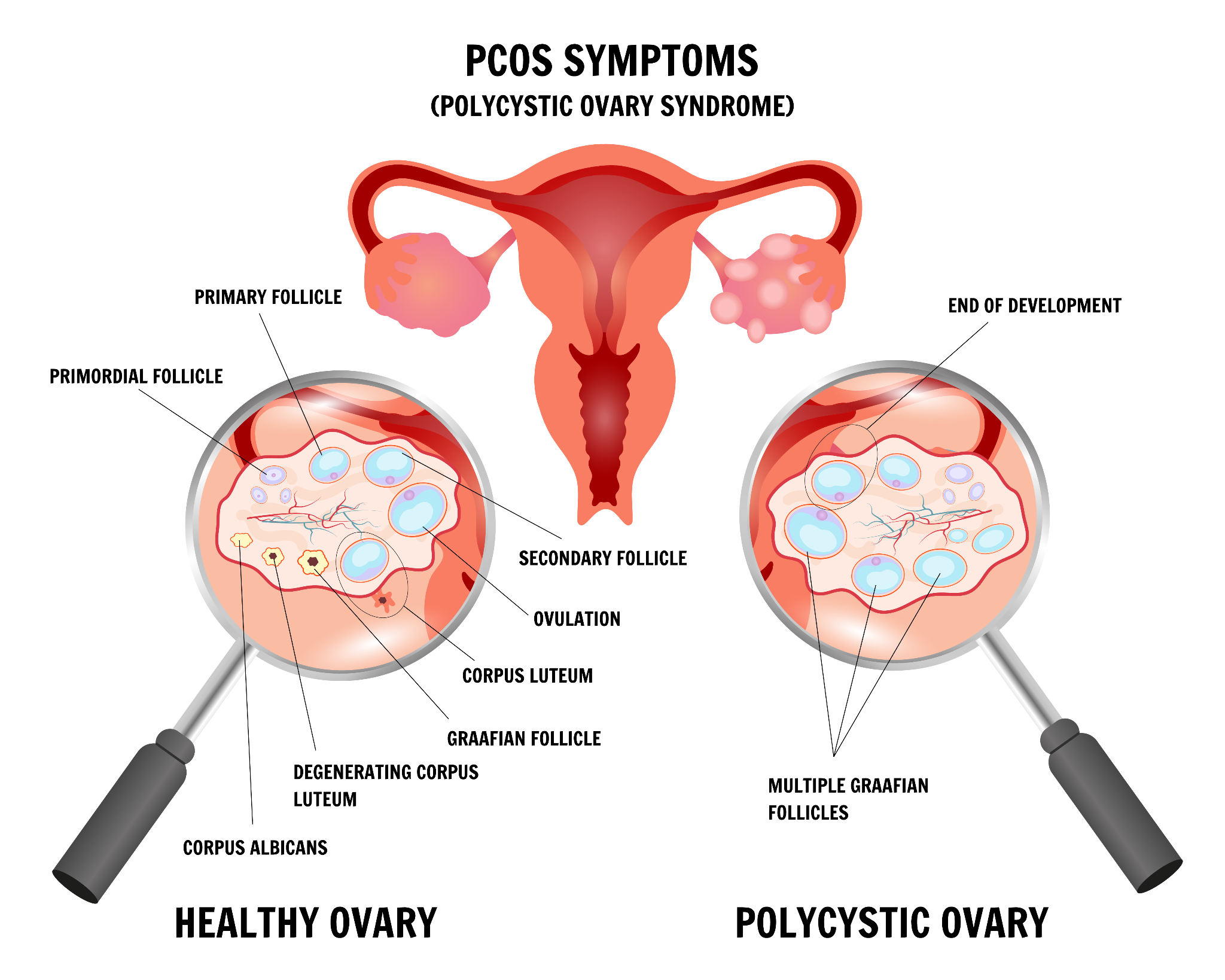
A doctor explaining the female reproductive system to a patient.
Polycystic Ovary Syndrome, also referred to as PCOS, is one of the most common hormonal disorders in women of reproductive age. Despite its prevalence, PCOS remains misunderstood and underdiagnosed. Knowing about its causes, symptoms and treatment measures can empower women to manage their health better and lead a fulfilling life.
PCOS (Polycystic Ovary Syndrome) is a disorder of the ovaries in which a woman's ovaries make too much androgen, which are male hormones that are normally found in small amounts in women. The ‘polycystic’ part of the name comes from the many small fluid-filled cysts that can develop on the ovaries. Cysts are not present in all women with PCOS and cysts are not present in all women with PCOS. PCOS impacts almost 1 in 10 women globally and can affect not just reproductive health but even overall physical and mental well being.
In a healthy menstrual cycle, the ovaries release one egg every month during ovulation. In PCOS women, there is an imbalance in hormones that blocks this process. The ovaries may develop many small follicles that fail to mature and release eggs leading to irregular or missed periods.
One of the major hormones that play a role is insulin. Most women with PCOS are insulin resistant which means they make insulin but cannot use it efficiently. This results in increased blood sugars and adds to the risk of type 2 diabetes. Increased levels of insulin causes the ovaries to make more androgens and contribute to symptoms such as acne, hair growth and irregular cycles.

Medical infographic of a healthy ovary and a polycystic ovary.
PCOS may manifest differently in different individuals and therefore diagnosis is challenging. But some of the most prevalent signs are:
Infrequent, long or no periods are among the first and most prominent signs.
Most women find themselves growing more hair on the face, chest or back because of high androgen levels.
Acne breakouts, especially along the jaw or lower cheek resulting from hormonal imbalance.
Insulin resistance can make weight management challenging.
Some women experience male-pattern baldness due to high androgen levels.
PCOS is the leading cause of female infertility because ovulation is irregular.
A skin condition known as acanthosis nigricans can be evident in dark patches on the neck, armpits or groin.
Emotional symptoms such as depression, mood swings and anxiety also occur because changes in the hormones can impact self esteem as well as the mental state.
While there is no cure for PCOS, it can be managed effectively with a combination of medical treatment, lifestyle changes and regular monitoring.
Lifestyle modifications are usually the initial treatment for PCOS. Even a 5–10% weight loss can substantially alleviate symptoms and return menstrual periods to normal.

A woman warming up before an outdoor workout.
Based on the symptoms, physicians prescribe various medications. These include birth control pills to regulate menstrual cycles and reduce androgen levels, metformin to improve insulin sensitivity and lower blood sugar levels, fertility medications for women trying to conceive and anti-androgen medications.
Regular check-ups with one's doctor are necessary to keep track of blood pressure, glucose and cholesterol levels due to the increased risk of type 2 diabetes, hypertension and heart disease caused by PCOS.
Aside from physical symptoms, PCOS can also be very taxing on the mind. Body image concerns, irregular menstrual cycles and infertility can lead to emotional turmoil. Most women experience anxiety, depression or feelings of isolation because of the uncertainty of the condition. Recognising these emotions and accessing support is part of the healing process. This could be in the form of therapy, counseling or PCOS support groups.
Although PCOS is a permanent condition, it is extremely manageable with the right approach. A blend of balanced diet, exercise, medical advice and mental health can enable women to take control of their hormones and well being once again.
Education and awareness are the starting points. The better women know their bodies and the science behind PCOS, the more empowered they are to make healthy decisions that support long term well being.
If you think you may have PCOS, don't hesitate to see a healthcare professional. The sooner you act, the better.
We offer expert care across key specialties, including Medicine, Cardiology, Orthopaedics, ENT, Gynaecology, and more—delivering trusted treatment under one roof.
Prakash Hospital Pvt. Ltd. is a 100 bedded NABH NABL accredited multispecialty hospital along with a center of trauma and orthopedics. We are in the service of society since 2001.
OUR SPECIALITIES
Contact Us
D – 12A, 12B, Sector-33, G. B. Nagar, Noida, Uttar Pradesh 201301
+91-8826000033

© 2026 All rights reserved.
Designed and Developed by Zarle Infotech